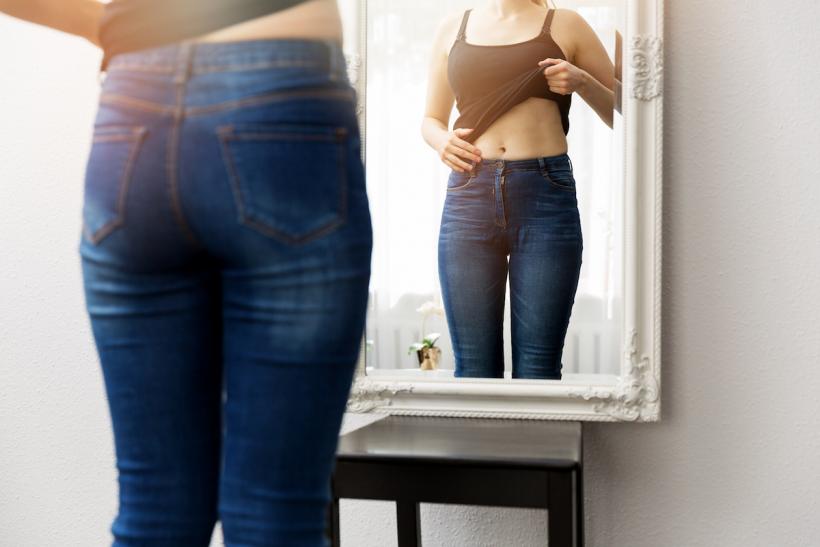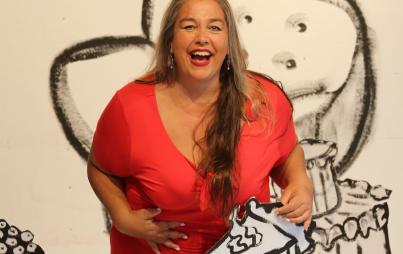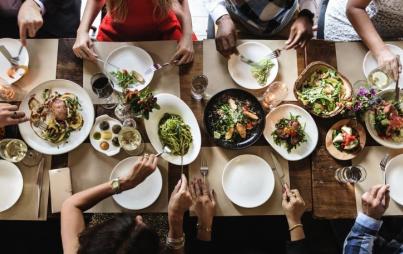
CN: weight talk
I’m pretty sure I found body positivity as a thin person. I’m certainly not skinny or what is deemed “model thin,” but I am society’s acceptable version of “fat” or “curvy” or “thick.” I’m a size 10 and weigh 150 pounds.
I’m not even “Lane Bryant fat,” as Roxane Gay so brilliantly calls it in her new memoir, HUNGER: A Memoir of (My) Body. The women’s retailer sells extended clothing sizes 14 to 26, therefore I am below “Lane Bryant fat.” I also am below the average size woman living in the U.S., which is currently a size 16 (not 14, as was previously thought).
I’ve always flown under a threshold of so-called fatness, and yet I still felt compelled to go on my own body positivity journey. As the typical bopo fairytale goes, I started reclaiming my body and my own ideas of beauty. I affirmed this by consuming body positive literature and art. I reached total acceptance and self-love, and shouted it out from the internet rooftops with semi self-obsessed and preachy Instagram and Facebook posts. I lived happily ever after. The end.
The problem with my happy ending is this: I have no clue what it’s like to be visibly fat, so maybe my body image issues are kind of bullshit.
“They know some of the challenges of being fat, but they don’t know the challenges of being very fat,” Gay writes presumably of people like me, or like others who can fit in those Lane Bryant sizes. And she’s right.
Like many women in this culture, I’ve lived with internal voices in my head telling me I’m fat, ugly, and not good enough since grade school. This negative and relentless mental chatter was reinforced by the images I saw on a daily basis, images that represent a very narrow version of beauty — mainly thin and white. I am not immune to these things.
I’ve calculated more calories in my head than dollars in my bank account. I am not proud of this.
I won’t invalidate all of my body image issues because of all the very real, very painful grief they have caused me, but the real deal is this: I reached a place of peace with my body because it was way easier for me.
Certainly, I have struggled in many of the same ways as fat people, but I haven’t moved through the world as a fat person. I have internalized fatphobia, but the world doesn’t see me as fat. I won’t invalidate all of my body image issues because of all the very real, very painful grief they have caused me, but the real deal is this: I reached a place of peace with my body because it was way easier for me.
“To be clear, the fat acceptance movement is important, affirming, and proudly necessary, but I also believe that part of the fat acceptance is accepting that some of us struggle with body image and haven’t reached a place of peace and unconditional acceptance,” Gay writes.
I could reach acceptance because my body has never stopped me from traveling, writing, making TV appearances, meeting up with friends, or having sex.
My body never stopped me from parading my so-called new-found body positivity all around the internet. Right here on Ravishly, I wrote an article about how freeing it was to post my first postpartum, semi-nude selfie on social media. Muffin top and all. It felt like the ultimate eff you to beauty standards, one that was immediately celebrated online. Friends shared my work and claimed I was “brave” and “honest” and “real.” I found online support like I never had before, which only bolstered my view that body positivity was something that everyone could and should achieve. I myopically thought my story and journey as a “thick” woman carried the same struggles as everyone else.
“They’re the ones I find that are often the strongest cheerleaders of: This is who I am, and you have to take me as I am and respect me because of my body, not despite it. And I admire that a great deal. But I think it’s easier to feel that way when you have multiple places where you can buy clothes and feel pretty and move through the world,” Gay said on This American Life.
My body has also never stopped me from shopping and finding flattering clothes to fit my figure. I’ve had the privilege — more specifically, the thin privilege — of trying on an amazing dress and feeling fantastic about myself in a mainstream store.
You Might Also Like: Sizeism Makes It Expensive To Be Fat And Wear Clothes
This is not the experience of others who are seen as fat.
Existing outside of our culture’s acceptable “fatness” means you won’t be able to find clothes that fit you properly, let alone make you feel beautiful. It means stigmatization. Moving in this world as a fat person means people will outright hate you. They will harass you. They will abuse you. They will stare and laugh at you. They will judge you, both silently and loudly. They will watch and scrutinize the foods you put in your mouth. They will assume you’re lazy.
My body has never made me the subject of fat-centric abuse, harassment, or discrimination.
I don’t have to deal with admonishing doctors who are supposed to be diagnosing my cold but focus on my weight instead. I don’t need a seatbelt extender or two seats on an airplane. I don’t need to worry if a chair at a restaurant has arms. I will always fit. I will always fit in. My dignity will not be stripped away by a culture that doesn’t make real accommodations for fat people. Nor will I be reduced to nothingness on account of my size.
“I hate how people treat and perceive me,” Gay writes. “I hate how I am extraordinarily visible and invisible."
I don’t have a so-called “unruly body,” as Gay calls it. Therefore, my body still plays by the societal rules and meets the expectations of what a woman “should” look like. I’m not saying women who look like me (or who are thinner than me) should not be part of the body positive movement. We’re all invited, and there’s enough room for everyone. But we need to be mindful of the messages we put out there.
Are we being honest about our privileges? Are we being authentic? Are we being inclusive? Are we buying into the commercializing and trending of "body positivity"? Are we doing more damage when we pretend our “healthy” lifestyle is anything other than dieting? I mean, c’mon. Yes, kale quinoa bowls are healthy, but for many people, kale quinoa bowls are barfy and indeed dieting. If given the choice based solely on taste buds, who the fuck is honestly choosing kale quinoa anything over a slice of pizza or a taco?
Let’s just call dieting what it is: dieting. It’s not “healthy,” it’s not “strong,” and it’s not for “fitness” reasons. How is lying about our motivations liberating any of us from the cages of body oppression and hate?
“I want to move freely. I want to be free,” Gay writes.
If we all want to be free, we need to start fessing up about the bullshit we are being fed and are feeding to others when we say we’re body positive. Only then can we truly aim to reach unconditional acceptance and celebration of all bodies. And even if we don’t, we need to be honest about that too.








